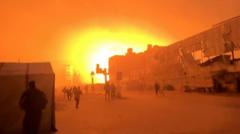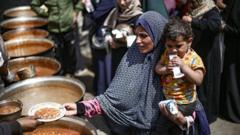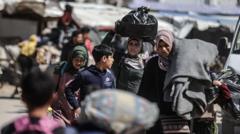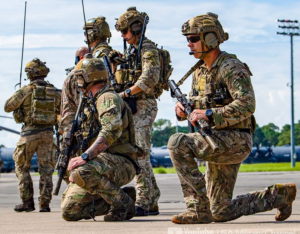Israel's military strategy intensifies with the expansion of security zones in Rafah, raising humanitarian concerns as new evacuation orders are issued.
**Israel Expands Security Zones to Include Rafah Amid Ongoing Conflict**
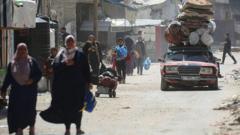
**Israel Expands Security Zones to Include Rafah Amid Ongoing Conflict**
Israel's Defense Minister announces the inclusion of Rafah in military "security zones" in Gaza as civilian evacuations continue.
Israel's Defense Minister, Israel Katz, has declared the expansion of Gaza's "security zones" to encompass the southern city of Rafah, a strategic move aimed at intensifying pressure on Hamas to release hostages. During a recent visit, Katz emphasized the military's goal of making Gaza "smaller" and "more isolated," asserting that this approach would pressure the militant group following the end of a ceasefire in early March.
The expansion of designated areas in Rafah follows previous efforts by the Israeli military to establish control over nearly two-thirds of Gaza, characterized by the United Nations (UN) as "no-go" zones or areas under evacuation orders. More than 390,000 Palestinians have reportedly been displaced since hostilities resumed, according to UN reports. With the blockade of humanitarian aid since early March, supplies of essential items like food and medicine have run critically low in the territory.
Rafah, which housed around 280,000 residents prior to conflict escalations, has witnessed significant devastation from Israeli ground offensives launched last May. The military's recent actions have included a wide-ranging evacuation order affecting approximately 97% of the city and its surroundings, effectively tearing at the fabric of local communities and leaving families with few safe options.
Israeli Prime Minister Benjamin Netanyahu's announcement of the military's control over the strategically important Morag Corridor has also raised eyebrows. The corridor is intended to restrict smuggling operations from Egypt, further tightening Israel's grip over the territory. Analysts from the Israeli military suggest that the recent strategies aim to corral Palestinian civilians towards the coastline, thereby giving Israeli forces the ability to focus on eliminating Hamas without civilian interference while potentially controlling humanitarian aid delivery.
Despite the ongoing military actions, the UN's human rights office has raised concerns that Israel’s evacuation orders are inconsistent with international law and accused the government of failing to provide adequate accommodations for displaced civilians. Israel maintains that these measures are necessary to safeguard civilians from Hamas's use of human shields, asserting that the military operations are conducted within the confines of international humanitarian law.
The conflict's toll continues to climb, with over 50,880 fatalities reported in Gaza as of now, according to the local health ministry. In another development, the Israeli Defense Forces (IDF) announced the killing of a Hamas commander in an airstrike targeting eastern Gaza City, emphasizing their ongoing campaign following the unprecedented cross-border attack on October 7, 2023. The cycle of violence and its humanitarian consequences have added layers of complexity to an already fraught geopolitical landscape.
The expansion of designated areas in Rafah follows previous efforts by the Israeli military to establish control over nearly two-thirds of Gaza, characterized by the United Nations (UN) as "no-go" zones or areas under evacuation orders. More than 390,000 Palestinians have reportedly been displaced since hostilities resumed, according to UN reports. With the blockade of humanitarian aid since early March, supplies of essential items like food and medicine have run critically low in the territory.
Rafah, which housed around 280,000 residents prior to conflict escalations, has witnessed significant devastation from Israeli ground offensives launched last May. The military's recent actions have included a wide-ranging evacuation order affecting approximately 97% of the city and its surroundings, effectively tearing at the fabric of local communities and leaving families with few safe options.
Israeli Prime Minister Benjamin Netanyahu's announcement of the military's control over the strategically important Morag Corridor has also raised eyebrows. The corridor is intended to restrict smuggling operations from Egypt, further tightening Israel's grip over the territory. Analysts from the Israeli military suggest that the recent strategies aim to corral Palestinian civilians towards the coastline, thereby giving Israeli forces the ability to focus on eliminating Hamas without civilian interference while potentially controlling humanitarian aid delivery.
Despite the ongoing military actions, the UN's human rights office has raised concerns that Israel’s evacuation orders are inconsistent with international law and accused the government of failing to provide adequate accommodations for displaced civilians. Israel maintains that these measures are necessary to safeguard civilians from Hamas's use of human shields, asserting that the military operations are conducted within the confines of international humanitarian law.
The conflict's toll continues to climb, with over 50,880 fatalities reported in Gaza as of now, according to the local health ministry. In another development, the Israeli Defense Forces (IDF) announced the killing of a Hamas commander in an airstrike targeting eastern Gaza City, emphasizing their ongoing campaign following the unprecedented cross-border attack on October 7, 2023. The cycle of violence and its humanitarian consequences have added layers of complexity to an already fraught geopolitical landscape.

